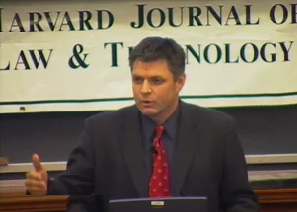
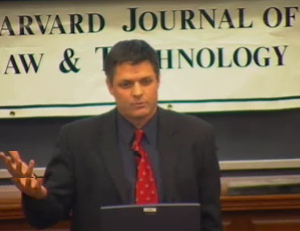
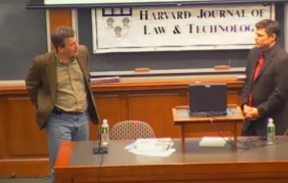
2 February 2004
Those of you who know me know I don't miss lab on a whim. But when Erica zephyred me saying that Darl McBride [ http://www.caldera.com/company/execs/dmcbride.html ] (head of SCO) was speaking at Harvard [ http://jolt.law.harvard.edu./p.cgi/speakers.html ], I knew we had to do something. Our first thought was, in proud MIT tradition [ http://hacks.mit.edu/ ], a hack. May be water balloons, maybe paper airplanes. But hacks are hard to do without causing some sort of damage, and these people have proven that they are willing to sue everyone in sight.
Our obvious choice, then, was to provide anti-FUD. Based on help from people on my zephyr class, we assembled a nice set of flyers full of pro-Linux [ http://www.linux.org/ ] and pro-GPL [ http://www.gnu.org/ ] information. We figured that, as this was a talk put on by the Harvard Journal of Law and Technology [ http://jolt.law.harvard.edu/ ] , the audience would mostly be lawyers. Maybe they've never heard of the GPL? Maybe they think Linux is some sort of furry pet?
So we made up these flyers. They were all done in Adobe Illustrator under Windows (Oh, the irony!) but looked really professional. Above all, we wanted to go and present the non-RMS, non-crazy-anti-IP side of linux. We even dressed up.
At around 6:05 (the talk was scheduled to begin at 6:30) we decided to get started. Our 60 handouts, complete with Knoppix CDs, were ready. Erica and I went out in front of the auditorium, and Clare et. al. stayed behind, to hand them out to people already inside. Upon meeting some people from the Journal, they admitted that they knew Darl would be a contentious speaker, and simply asked that we tell people that we were in no way affiliated with the journal or Harvard.
Our speech went something like "Hi, we're not affiliated with this talk in any way, we're just a group of concerned MIT students who have some information about Linux, the GPL, and SCO that we'd like to provide to perhaps counter some of the claims that will be made by the speaker tonight." Only one person said no to a handout. Several said that we were "preaching to the choir", others admitted to having run linux for many years.
McBride starts off by talking about the role of intellectual property in the digital age. He talks briefly about copyright law in the digital age, and asks about Napster, and then talks about linux being free, and seems to be suggesting that "free things on the internet require violation of copyright". He traces through the ownership of UNIX IP, and then argues that the change between 2.2 and 2.6 was largely due to corporate help.
He also repeatedly argues that, per recent supreme court decisions, copyright exists to benefit the public by creating profit incentive. He keeps painting the IP debate as a pendulum swinging between public and private ownership, but continually stresses "Do we want a world where all IP is free?" which of course, no one is arguing for. He mentions that the GPL hasn't been tested in court (an allegation nicely refuted by the FSF's counsel, who was quoted on our quotes page as saying "It's not been tested because the people we've enforced it with haven't risked going to court").
Then (and the specific order here is a bit hazy) he moves onto what I'll call the FUD section. First, he tries to discredit the linux vendor indemnification efforts (which I will admit are rather weak, although he fails to mention that proprietary providers don't indemnify you against, well, anything). He discusses suing end users, including (I believe) plans to sue some end users in court very soon.
He then puts up a "cyberterrorism" slide which discusses recent DDOS attacks against SCO, and claims that a member of the linux community claimed that a high-level linux hacker was responsible for at least one of the attacks (I'd love to see that citation). He discusses MyDoom, and also evidently someone on slashdot who posted his home address and phone number, resulting in a DDOS of his house during the superbowl (Why the president of a technology company didn't think to unplug the phone is beyond me).
He also hints that, since open source software isn't subject to the same export control restrictions as proprietary stuff, Open Source software gets used by terrorists. At this point we've strayed so far from his original copyright infringement claims that I believe the audience is a bit lost, recognizes this as FUD, and appears to be leafing through our handouts.
There were so many things I wanted to ask! But I begin with "We're MIT students, IP is important to all of our work, we're not lawyers..." but "we have such faith in the GPL and linux that we've taken the liberty of distributing a copy to everyone in the audience. By the way, if you want a copy and didn't get one, speak to me afterwards. " I go on to ask why they require people to sign NDAs for them to point out what parts of the kernel are infringing, when the source (holding up my 3-inch burned copy of the 2.6.1 sources) is available for anyone to see already?
His response was that this would be essentially SCO showing its IP in public, and that contracts with other vendors prohibit them from doing so. I took this to mean that they had licensed their IP to others under some strange license which prohibited disclosure. Vimal suggested (more rationally) that perhaps they don't feel they have complete rights to all of the IP, and that in fact some other people own parts of it, and thus they can't legally show it without an NDA.
Other great questions included (from law students!) "Given that you've suggested the GPL is invalid, under what license are you currently distributing Samba?" McBride (and by this time, his VP of software licensing) argued that, no, really, they do like the GPL, it's not evil, and they are part of a lot of open source projects.
[Here are more questions, some of which are a bit lame, but the big one is...]
Erica's question (the second to last, as McBride claimed "that girl really wants to ask a question") was "You've said you like the GPL, that you distribute GPL products, and that people should be able to contribute however they want. Why then did you claim in December that you believe the GPL violates the constitution, and US patent and trademark law?"
McBride's response was essentially "look, over there, something shiny! next question!"
But even after that, Dave went to ask McBride why he was trying to conflate terrorism and open source software. Well, this begins the "4th East sits down and chats with Darl McBride" session.
First, he cited some article which evidently claims that terrorists are using open source software, or something like that. Something about how now, linux's n-way capabilities make it fall under dual-use technology and therefor it's somehow evil. We didn't really get the citation. But we started asking him more questions -- we repeatedly argued that we are engineers, and we value copyright and patents -- this is, after all, how we make a living.
Darl repeatedly returned to the issue of their IP being in linux, which I think is a very very valid point. They also argue that, without their IP, 2.6 would not be a server-class OS, and thus perhaps everything back to 2.2 is suspect.
He also claimed that a lot of the shown source code which has been mocked by the OSS community might actually be in doubt, dating back to the sealed AT&T/BSD agreements, and that remains to be seen.
I had the guts to ask him what he thought of "Pump and Dump" allegations, to which he responded that at one time SCO stock was much higher, and then it bottomed out to where the company only had a $6m aggregate worth, and now it has come a bit back up, but they're not selling their stock, and they'd have a long way to go to be considered pump and dump. This is pretty much what everyone on slashdot had said, but I still wanted to ask.
Finally, I told him point blank that "you should fire your PR department". We all care about intellectual property, and if copyrighted code is indeed in linux, we want it out of there, even if it sets the kernel back years. But their FUD is just unbearable -- arguing the constitutionality of the GPL, and all their bizzare copyright claims over other unrelated code, and all this terrorism BS. He looked taken aback -- the people, who came with such a strong set of opinions against SCO, were saying that they agreed with the root of their case, that maybe something had been misappropriated, and that the courts should decide it. But the message was getting lost amongst all their constant BS.
He even looked back to his Software VP (Chris Sontag) guy and said "I guess what they're saying is that if we tone down the anti-GPL stuff a bit, we'll look better" (that's a mild paraphrase). The Software VP guy looked shocked, and didn't like that idea at all.
Around this time, they had to leave. Our personal bull session with Darl McBride, perceived enemy of free and open source software, was over.
Walking home, we realized a few key points:
And about missing lab: Matt [ http://web.mit.edu/wilsonlab ] argued the other day that "science" as a way of discovering truth transcends any one individual, and in fact doesn't care about competition or reward or any of those things. He seemed to suggest that science was something higher than him, and that he felt he had an obligation to fight to keep it pure. I feel the same way about engineering, and about notions of intellectual property, and about Linux. Notions of idea ownership touch everything I do, and today I was able to focus my efforts on advancing those causes in a different way than I normally do in lab.
So see, I really was still doing lab work. :)
Eric Jonas [ http://web.mit.edu/jonas/www/ ]
jonas at mit dot edu
or, as in the handouts
golinux at mit dot edu



Here you can see our row of nerds -- we're the row with the two people standing
up (Javier and Clare) on the left:
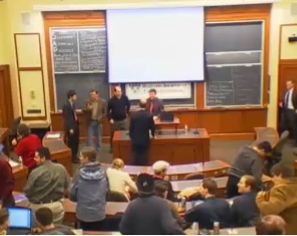
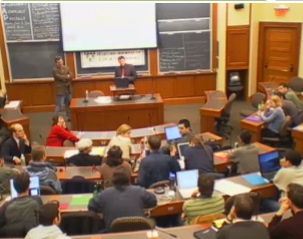
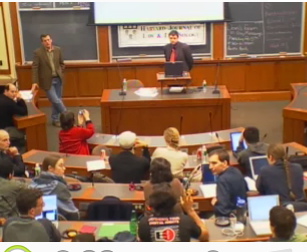
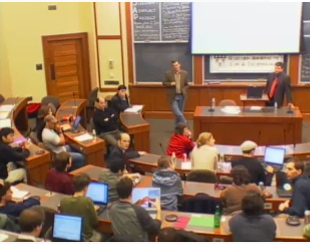
Copyright 2004 http://web.mit.edu/jonas/www/